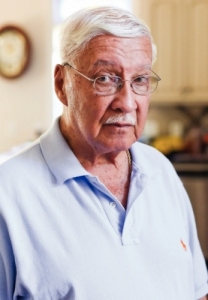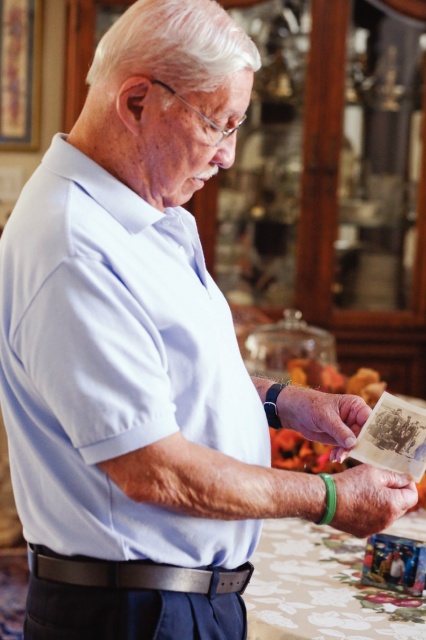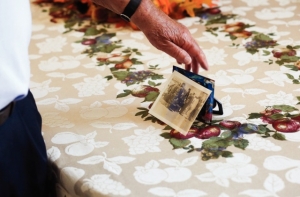Memories of survival
By Joey Pitchford
Published in News on October 1, 2016 10:09 PM

News-Argus/SETH COMBS

News-Argus/SETH COMBS
Danny Clay holds a photo taken of the Japanese surrender ceremony at the end of World War II. For Clay the moment meant freedom and a new start for him and his family, who had been held captive at two different Japanese Concentration Camps.

News-Argus/SETH COMBS
For many, World War II is planted firmly in the history books.
For Goldsboro's Danny Clay, however, memories of his five years spent in Japanese-run internment camps in the Dutch East Indies will never fade.
Born in Holland, Clay moved to the Dutch East Indies - now known as Indonesia - as a small child. Clay's parents both worked for the Dutch government, and lived in the city of Surabaya on the island of Java, the East Indies' most populous island.
Clay's father worked as a customs inspector; his mother an assistant to the Java postmaster. Clay said he lived the life of a normal child, playing with his siblings and enjoying life on the island.
Everything changed when the Japanese attacked.
When war broke out, the Japanese Imperial Army quickly overtook many islands in the Pacific. They reached the shores of the East Indies in 1942 and quickly rolled over the allied defenses.
The Japanese consolidated their invasion by decisively turning back allied counterattacks during the Battle of the Java Sea in February of that year.
"They swarmed over the whole island, they were like ants," Clay said. "There were soldiers everywhere."
As the Japanese soldiers took over the city, they began rounding up the men and taking them away from their families. Word quickly spread, and Clay's family became aware of the danger they were in.
"We were told not to try to resist," Clay said. "They said 'don't resist or they're liable to shoot you and your whole family.'"
Early in the occupation, the Japanese military was focused on wiping out any connections to the royal Dutch family that inhabitants might have had. If the soldiers found anything related to the royal family in someone's home, it was grounds for execution by beheading.
When the Japanese soldiers came to Clay's home, his mother had to act quickly to hide a set of plates bearing the royal family's image.
"The thing I'll never forget - well, there are a lot of things I'll never forget - my mother had in the receiving area this little upholstered sewing chair that you could open up and store sewing materials in," Clay said.
"What my mother did, in a big hurry she took all of the plates off of the wall and put them in that little sewing cabinet, the little sewing chair. And she made me sit on it.
He wasn't but 5 or 6 years old, but he knew it would cause for execution if the Japanese found it.
"So I sat there."
The Japanese soldiers combed Clay's house, but they never found the plates.
Instead they took his father.
"That was the last time I saw him for five years," he said.
Two weeks later, the soldiers returned for the rest of the family. They were placed in an internment camp, one of many that the family would move between over the course of the war.
Clay feels fortunate that he was so young during his time in the camps. He doesn't remember as much of it as his parents or his older brother did, and he doesn't have nightmares. He does remember being constantly hungry, and the violence his captors used to assert control.
"The Japanese, they killed to show they were in control, to intimidate you," Clay said. "When we walked by the guards we were supposed to bow to them."
He recalls what happened to an elderly man who refused to bow.
"He actually spat at the guard, and the guard came out and cut his head off," Clay said, pausing to make a slicing motion across his throat.
"I saw his head roll along the ground into a ditch. I'll never forget that."
Many of the killings came courtesy of the Kempeitai, a secret police arm of the Japanese army similar to the Nazi Gestapo. Clay said that the clandestine group would appear in the camps unannounced to question prisoners. If prisoners couldn't provide the information the Kempeitai wanted, they were executed.
"When they came around, watch out," Clay said. "They were very cruel. Even if you didn't know anything, if they thought you knew something and weren't telling them, that was it."
Clay, with his family, was moved around to several camps throughout his imprisonment as the Japanese sought to hide the prisoners from the Allies. When Japan eventually surrendered in 1945, Clay thought his ordeal would be over.
Unfortunately for the Dutch inhabitants of the East Indies, it was not to be. A major part of the Japanese campaign in the islands had hinged on granting power back to the native peoples of the area, and those same people took control of the camps within days of the Japanese withdrawal.
They simultaneously claimed independence from the Dutch and eventually forced the Netherlands to reluctantly recognize their sovereignty in 1949.
Clay and his family would not be in the camps that entire time, as they were shipped back to Holland in 1947. There, Clay reunited with his father, who had reached Holland before them after spending the last five years working on the Burma railroad.
Clay attended school in Holland until he graduated at age 17, then left for Saudi Arabia where he worked for the Aramco oil company before finding his way to California.
As a Dutchman, Clay did not have any claim to citizenship in America, and decided to enter the Air Force as a way to cement his new life in the states.
While in the Air Force, Clay was given a choice. He could be transferred to one of three places - Hawaii, Korea or Japan.
Clay chose Japan.
"I was there for three-and-a-half years, and I fell in love with the Japanese people," he said. "They were totally different."
Clay has books on Japanese history throughout his home, and at one point collected Japanese swords.
Clay said he harbors no resentment towards the Japanese people.
"It was a time of war, war is a terrible thing," he said.
He added that his Japanese friends are shocked when he tells his story. They are surprised that their government could have been capable of such cruelty.
Having spent the last 55 years in Goldsboro, Clay said he can now look back on his experiences with the clarity of hindsight. He has a few lessons learned that he keeps with him today.
"Live life right now, be aware of your surroundings, and be thankful to God."
